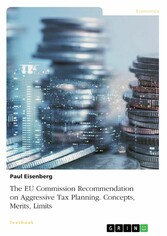Suchen und Finden
Service

The EU Commission Recommendation on Aggressive Tax Planning. Concepts, Merits, Limits
Paul Eisenberg
Verlag GRIN Verlag , 2019
ISBN 9783668875920 , 86 Seiten
Format PDF
Kopierschutz frei
Geräte
Mehr zum Inhalt

The EU Commission Recommendation on Aggressive Tax Planning. Concepts, Merits, Limits
Document from the year 2014 in the subject Business economics - Law, grade: Overall Degree 1,3, University of Linz, language: English, abstract: This work focuses on the Commission Recommendation of 06.12.2012 on aggressive tax planning C(2012) 8806 final. It aims to analyse the concepts and definitions underlying the Recommendation, its legal basis and its impact on the EU, international, academic and professional debate about aggressive tax planning. The discussion works through a thorough literature review covering primary and secondary EU law, ECJ jurisprudence, political announcements of the OECD and other international organisations. Detailed tables summarise the key issues discovered. The Recommendation has been neither unanimously adopted, nor rejected by the public. It provides broad definitions already addressed in a more precise manner in other official publications. Its approach against double non-taxation is similar to that of the ECJ and its GAAR proposal has gained ground with regard to the recent OECD announcements. The main criticism arises from the academia: the Recommendation is considered to be too general and to deviate widely from the established methodologies. The scope of the Recommendation lies on direct taxation of business activity which precludes analysis of indirect taxes as well as statutory wrongs like harmful tax competition or state aid. The study enriches the academic publicity on the Recommendation that has experienced only modest coverage by the taxation scholarship following its release.
Shop

